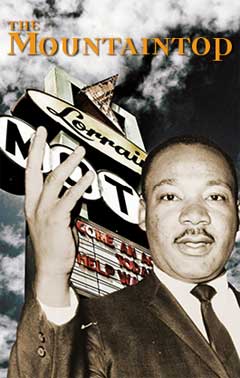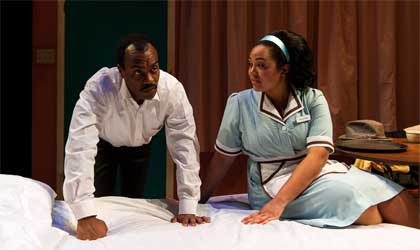Play (2009)
by Katori Hall
Directed by Megan Sandberg-Zakian
Underground Railway Theater
Central Square Theatre
Cambridge, MA
January 10 – February 3, 2013
With Maurice Emmanuel Parent (King), Kami Rushell Smith (Camae)

Courtesy Central Square Theater
Martin Luther King, Jr. is at the Lorraine Motel in Memphis; it is the place where he will meet his end. Having just given a rousing speech on behalf of the striking sanitation workers there, he is visited by a woman, apparently a maid at the motel, from whom he bums cigarettes and with whom he discusses a whole range of issues. As the vista of the conversation and the context within which it takes place broadens, a focused view of King’s distinctive character and visionary sensibility, within the landscape of his human foibles, comes into relief.
Underground Railway Theater has mounted this production as a commemoration of the 150th anniversary of Abraham Lincoln’s Emancipation Proclamation; and, of course, it also arrives at the time of year during which we observe Martin Luther King, Jr. Day.

“Emancipation Proclamation”
(Issued January 1, 1863)
Courtesy National Underground Railroad
Freedom Center
Cincinnati, OH
Only two characters appear in this play: Martin Luther King, Jr. and Camae, the woman who comes into his room at the motel. How that encounter evolves, and what it reveals about who each of them really is, forms the crux and mystery of the play. Through its unbroken ninety minutes, this continuously building dialogue serves to convey a sense of King’s greatness through a complex lens.
There is attenuation in this play, and one might wonder for considerable time what is going on, but, in the end, the power of the anticipation yields its interesting results.
In its own unique and curious way, this play brings out King’s vulnerabilities in the service of something broader and more penetrating. The narrative method is inventive and offbeat but provides a springboard for the focus it seeks to create.

Kami Rushell Smith as Camae
in “The Mountaintop”
Photo: A.R. Sinclair Photography
Courtesy Central Square Theater
Maurice Emmanuel Parent (King) and Kami Rushell Smith (Camae) are both very good in the two major roles.
Smith is very funny and plays her gag lines with great aplomb. She has an alluring suggestiveness that she plays to the hilt, particularly early on as we watch Emmanuel Parent’s King deliver a nuanced dance in response.
Parent is a good, down to earth, King, who plays the difficult balance between his human susceptibility and his visionary resilience very well. When the time comes to distinctively elevate that portrayal, Parent meets the challenge adeptly.
The unique turn of the narrative demands an attenuation that gradually stretches towards the distilled vision it seeks to create.
The associated wait feels something like that in Eugene O’Neill’s four hour play, Long Day’s Journey Into Night, which seems to go on forever, and somewhat laboriously, in its anticipatory phases; when, in the last act, it hits its final stride, we get the dramatic payoff, and see that the long wait was the ground in which the succeeding, and compelling, dramatic realization was planted.
Here, as well, that culmination is striking and fulfilling, and a distinctively conceived tribute to a great leader.
– BADMan
Leave a Reply